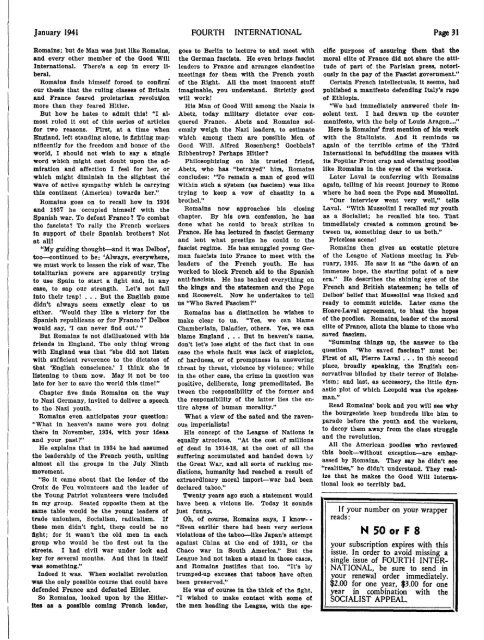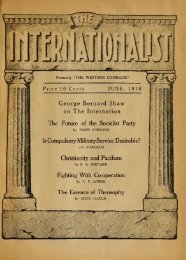January 1941 - Marxists Internet Archive
January 1941 - Marxists Internet Archive
January 1941 - Marxists Internet Archive
Create successful ePaper yourself
Turn your PDF publications into a flip-book with our unique Google optimized e-Paper software.
<strong>January</strong> <strong>1941</strong><br />
FOURTH<br />
INTERNATIONAL<br />
Page 31<br />
Romains; but de Man was just like Romains,<br />
and every other member of the Good Will<br />
International. There's a cop in every liberal.<br />
Romains finds himself forced to confirm<br />
our thesis that the ruling classes of Britain<br />
and France feared proletarian revolut4on<br />
more than they feared Hitler.<br />
But how he hates to admit this! "I almost<br />
ruled it out of this series of articles<br />
for two reasons. First, at a time when<br />
England, left standing alone, is fighting magnificently<br />
for the freedom and honor of the<br />
world, I should not wish to say a single<br />
word which might cast doubt upon the admiration<br />
and affection I feel for her, or<br />
which might diminish in the slightest the<br />
wave of active sympathy which is carrying<br />
this continent (America) towards her."<br />
Romains goes on to recall how in 1936<br />
and 1937 he 'occupied himself with the<br />
Spanish war. To defeat Franco? To combat<br />
the fascists? To rally the French workers<br />
in sUI>port of their Spanish brothers? Not<br />
at all!<br />
"My guiding thought-and it was Delbos',<br />
too--continued to be: 'Always, everywhere,<br />
we must wOTk to lessen the risk of war. The<br />
totalitarian powers are apparently trying<br />
to use Spain to start a fight and, in any<br />
case, to sap our strength. Let's not fail<br />
into their trap! ... But the English game<br />
didn't always seem exactly clear to us<br />
either. 'Would they like a victory for the<br />
Spanish republicans or for Franco?' Delbos<br />
would say, 'I can never find out.'''<br />
But Romains is not disillusioned with his<br />
friends in England. The only thing wrong<br />
with England was that "she did not listen<br />
with sufficient reverence to the dictates of<br />
that 'English conscience.' I think she is<br />
listening to them now. May it not be too<br />
late for her to save the world this time!"<br />
Chapter five finds Romains on the way<br />
to Nazi Germany, invited to deliver a speech<br />
to the Nazi youth.<br />
Romains even anticipates your question:<br />
"What in heaven's name were you doing<br />
there in November, 1934, with your ideas<br />
and your past?"<br />
He explains that in 1934 he had assumed<br />
the leadership of the French youth, uniting<br />
almost all the groups' in the July Ninth<br />
movement.<br />
"So it came about that the leader of the<br />
Croix de Feu volunteers and the leader ot<br />
the Young Patriot volunteers were included<br />
in my group. Seated opposite them at the<br />
same table would be the young leaders of<br />
trade unionism, Socialism, radicalism. If<br />
these men didn't fight, ther.e could be no<br />
fight; for it wasn't the old men in each<br />
group who would be the first out in the<br />
streets. I had civil war under lock and<br />
key for several months. And that in itself<br />
was something."<br />
Indeed it was. When socialist revolution<br />
was the only possible course that could have<br />
defended France and defeated Hitler.<br />
So Romains, looked upon by the Hitler<br />
Ites as a possible coming French leader,<br />
goes to Berlin to lecture to and meet with<br />
the German fascists. He even brings fascist<br />
leaders to France and arranges clandestine<br />
meetings for them with the French youth<br />
of the Right. All the most innocent stuff<br />
imaginable, you understand. Strictly good<br />
will work!<br />
His Man of Good Will among the Nazis is<br />
Abetz, today military dictator over conquered<br />
France. Abetz and Romains solemnly<br />
weigh the Nazi leaders, to estimate<br />
which among them are possible Men of'<br />
Good Will. Alfred Rosenberg? Goebbels?<br />
Ribbentrop? Perhaps Hitler?<br />
Philosophizing on his trusted friend,<br />
Abetz, who has "betrayed" him, Romains<br />
concludes: "To remain a man of good will<br />
within such a system (as fascism) was like<br />
trying to keep a vow of chastity in a<br />
brothe1."<br />
Romairis now approaches his closing<br />
chapter. By his own confession, he has<br />
done what he could to break strikes in<br />
France. He has lectured in fascist Germany<br />
and lent what prestige he could to the<br />
fascist regime. He has smuggled young German<br />
fascists into France to meet with the<br />
leaders of the French youth. He has<br />
worked to block French aid to the Spanish<br />
anti-fascists. He has banked everything on<br />
the kings and the statesmen and the Pope<br />
and Roosevelt. N ow he undertakes to tell<br />
us "Who Saved Fascism?"<br />
Romains has a distinction he wishes to<br />
make clear to us. "Yes, we can blame<br />
Chamberlain, Daladier, others. Yes, we can<br />
blame England •.. But in heaven's name,<br />
don't let's lose sight of the fact that in one<br />
case the whole fault was lack of suspicion,<br />
of hardness, or of promptness in answering<br />
threat by threat, violence by violence; while<br />
in the other case, the crime in question was<br />
positive, deliberate, long premeditated. Be<br />
tween the responsibility of the former and<br />
the responsibility of the latter lies the entire<br />
abyss of hUman morality."<br />
What a view of the sated and the raven<br />
O'Us imperialists!<br />
His concept of the League of Nations is<br />
equally atrocious. "At the cost of millions<br />
of dead in 1914-18, at the cost of all the<br />
suffering accumulated and handed down ty<br />
the Great War, and all sorts of raeking mediations,<br />
humanity had reached a result of<br />
extraordinary moral import-war had been<br />
declared taboo."<br />
Twenty years ago such a statement would<br />
have been a vicious lie. Today it sounds<br />
just funny."<br />
Oh, of cO'Urse, Romains says, I know-<br />
"Even earlier there had been very serious<br />
violations of the taboo-Uke Japan's attempt<br />
against China at the end of 1931, or the<br />
Chaco war in South America." But the<br />
League had not taken a stand in those cases,<br />
and Romains justifies that too. "It's by<br />
trumped-up excuses that taboos have often<br />
been preserved.,"<br />
He was of' course in the thick of the fight.<br />
"I wished to make contact with some of<br />
the men heading the League, with the spe-<br />
cific purpose of assuring them that the<br />
moral elite of France did not share the attitude<br />
of part of the Parisian press, notoriously<br />
in the pay of the Fascist goYernment."<br />
Certain French intellectuals, it seems, had<br />
published a manifesto defending Italy's rape<br />
of Ethiopia.<br />
"We had immediately answered their insolent<br />
text. I had drawn up the counter<br />
manifesto, with the help of Louis Aragon ...."<br />
Here is Romains' first mention of his work<br />
with the Stalinists. And it reminds us<br />
again' of the terrible crime of th~ Third<br />
International in befuddling th~ masses with<br />
its Popular Front crap and elevating poodles<br />
like Romains in the eyes ot the workers:<br />
Later Laval is conferring with Ito mains<br />
again, telling of his recent journey to Rome<br />
where he had seen the Pope and Mussolini.<br />
"Our interview went very well," tells<br />
Laval. "With Mussolini I recalled my youth<br />
as a Socialist; he recalled his too. That<br />
immediately created a common ground between<br />
us, something dear to us both."<br />
Priceless scene!<br />
Romains then gives an ecstatic picture<br />
of the League of Nations meeting in February,<br />
1935. He saw it as "the (lawn ot an<br />
immense hope, the starting point of a new<br />
era." He describes the shining "eyes of the<br />
French and British statesmen; he tells of<br />
Delbos' belief that Mussolini was licked and<br />
ready to commit suicide. Later came the<br />
Hoare-Laval agreement, to blast the hopes<br />
of the poodles. Romains, leader ot the moral<br />
elite of France, allots the blame to those who<br />
su ved fascism.<br />
"Summing things up, the answer to tbe<br />
question 'Who saved fascism l' must be:<br />
First of all, Pierre La val . . . in the second<br />
place, broadly speaking, the English conservatives<br />
blinded by their terror ot Bolshevism;<br />
and last, as accessory, the little dynastic<br />
plot of which Leopold was the spokesman."<br />
Read Romains' book and you will see why<br />
the bourgeoisie keep hundreds like him to<br />
parade before the youth and the workers,<br />
to decoy them away from the class struggle<br />
and the revolution.<br />
All the American, poodles who reviewed<br />
this book-without exception-are embarassed<br />
by Romains. They say he didn't Bee<br />
"realities," he didn't understand. They realize<br />
that he makes the Good Will International<br />
look so terribly bad.<br />
If your number on your- wrapper<br />
reads:<br />
N 50 or F 8<br />
, your subscription expires with this<br />
issue. In order to avoid missing a<br />
single issue of FOURTH INTER<br />
NATIONAL, be sure to send in<br />
your renewal order immediately.<br />
$2.00 for one year, $3.00 for one<br />
year in combination with the<br />
SOCIALIST APPEAL.
















